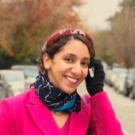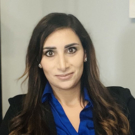Speakers

Yasmina Abouzzohour
Visiting Fellow
Brookings Doha Center

Khaoula Ben Gayesse
Tunisian Journalist

Tahani Elmogrbi
International Development Specialist & Libya Expert
Culmen International

Dalia Ghanem Yazbeck
Resident Scholar
Carnegie Middle East Center
Moderator

Reema Abuhamdieh
Presenter and Reporter
Al Araby Television Network
Event Summary
On August 5, 2021, Arab Center Washington DC (ACW) held a webinar titled “Tunisia’s Constitutional Crisis and Yearning for Democracy in Northwest Africa.” ACW Assistant Executive Director and Senior Fellow Tamara Kharroub offered welcoming remarks, and Reema Abuhamdieh, a Presenter and Reporter for Al Araby Television Network, served as moderator. The all-female panel comprised Yasmina Abouzzohour, Visiting Fellow at the Brookings Doha Center; Tunisian journalist Khaoula Ben Gayesse; Tahani Elmogrbi, International Development Specialist and Libya Expert at Culmen International; and Dalia Ghanem Yazbeck, Resident Scholar at the Carnegie Middle East Center.
The first speaker, Khaoula Ben Gayesse, said that ten days after Tunisian President Kais Saied suspended parliament and dismissed the prime minister on July 25, the country continues to walk “into the unknown.” The social factors that preceded the president’s decision, she explained, included vast corruption among Tunisia’s business elite, high unemployment, slow economic growth, and increasing inflation. By taking constitutional power into his hands—and monopolizing the legislative, judicial, and executive powers—the president upended the successes the country had accomplished over the last ten years, since the start of the Arab Spring. People wondered, what is Saied’s “road map for our democracy?” This is because until now, Ben Gayesse continued, there is no prime minister, parliament, or overall government, adding that this has ramifications not only for Tunisia but for the whole region. Many parties and organizations stand against Saied’s actions, while some support him because they want change or were against the revolution in the first place. The Islamist party, Ennahda, and Rachid Ghannouchi are “part of the problem,” Ben Gayesse argued. Nevertheless, she indicated that there is hope in Tunisia as people and organizations are trying to protect freedoms, pursue democracy, and fix the economic problems in the country.
In discussing the situation in Algeria, Dalia Ghanem Yazbeck said that Algeria has a policy of non-interference in the internal affairs of other countries and therefore has not commented on the Tunisian events. At the same time, she explained that “what happens in Tunisia has direct impact on what happens in Algeria,” at least because the two countries share a 1,000-kilometer border. On the political level, she said that since President Abdelaziz Bouteflika’s departure, very little has changed in the country; in fact, she noted that “the new Algeria looks a lot like the old Algeria.” The military continues to be a locus of power, and it organized the last election and chose Abdelmadjid Tebboune as president; it also coordinated the referendum for a new constitution and legislative elections. This way, she explained, the military reestablished a façade of democracy and protected its national reputation and internal cohesion, and it rehabilitated the intelligence services and reshuffled security services to maintain power over the years—and for the foreseeable future. One of the principal reasons is economic, Yazbeck said: as Algeria is a hydrocarbon-rich country and dependent on oil and gas for 95 percent of export revenues, the country has been highly vulnerable to an economic crisis. The pandemic exacerbated such conditions, pushing the government to draw on its foreign exchange reserves and depleting them heavily since 2013. During this time, Yazbeck said, the opposition Hirak continued its mobilization, despite repressive measures; in fact, now demonstrations are criminalized in Algeria. She concluded that the lack of trust of citizens in their civilian institutions has led to total inability of political institutions to satisfy people’s demands.
In looking at the region, Yasmina Abouzzohour, said that media, social media, public opinion, and emigration statistics show that in North Africa, people continue to have a desire to change the status quo. “As a whole, North Africa today doesn’t look much better than it did before the Arab Spring,” she added. The restrictions are not only on the public’s ability to influence the public sphere, but also on individual freedoms. Abouzzohour noted that in Morocco, some political reforms have been achieved since the Arab Spring, including a more empowered legislative branch, the requirement to appoint a prime minister who hails from the party that won the largest number of seats in parliament (and not by the monarchy), the inclusion of an Islamist party in government for the first time in the country’s history, and a more transparent electoral process. Even before the Arab Spring, she said, political and civil liberties were in place, such as the 2004 family code. However, some of the desired changes were not concluded, and the last 10 years have been marked by more repression and restrictions on freedoms and rights. In terms of governance, Abouzzohour continued, the greatest changes since 2011 were the 2016 elections, when administration-backed parties formed a coalition and blocked the implementation of any reforms, leading some to argue that the process of reforms has collapsed altogether. She offered some hope for Morocco’s future, saying that there remains a chance to de-escalate the situation and have dialogue with opposition actors and the wider population. Abouzzohour characterized Tunisia as “the good story of the Arab spring” and that the democratization process is a long and slow one, one that needs decades, if not centuries—so it is too early to tell how the situation in Tunisia will unfold.
Tahani Elmogrbi argued that the recent events in Tunisia did not constitute a coup d’état but rather a collapse of public order and the democratic process and a clash between government branches. She said that Tunisia has a mature middle class, powerful unions, and a well-developed civil society and nongovernmental actors and that historically, these groups believe in dialogue to resolve crises. She agreed that democracy is “a bumpy road” and requires years to develop effectively. Elmogrbi said that it serves the interests of countries such as Egypt, the United Arab Emirates, and Saudi Arabia to limit the power of Islamists in Tunisia and, therefore, to support President Saied. Others, like Qatar and Turkey, are concerned about Saied’s actions yet because they are both working to normalize relations with Egypt and Saudi Arabia, they may limit their intervention in Tunisia. She cautioned that the international community needs to pay attention to events in Tunisia and push for dialogue. As for Libya, she said that in the case of a collapse of public order in Tunisia, which she noted was unlikely, Libya could struggle with increasing numbers of radical groups infiltrating its borders, thus deepening security concerns. For his part, Khalifa Haftar—who had welcomed Saied’s moves—may take advantage of the situation to launch another war. The focus in Libya is now on elections, political dialogue, a constitutional framework, and the recent appearance of Saif al-Islam Qadhafi. She added that there is no appetite to start domestic protests in Libya at this time. However, Elmogrbi cautioned that the possibility of another armed conflict in Libya is high because of the absence of unified security forces.

